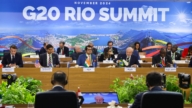【新唐人2015年02月13日讯】中共日前对美国高通公司(Qualcomm)开出反垄断史上最大罚单——近61亿元人民币,再次引发外界对在华外企的关注。“中国美国商会”(American Chamber of Commerce in China)发布的调查报告显示,尽管大多数在华美国企业能够获利,但许多企业高管感觉在中国不受欢迎,认为被中共当成了打击目标。
“中国美国商会”日前发布的《2015年度商务环境调查报告》显示,在477家受访企业中,有57%认为,中共当局最近展开的一系列调查是针对外国企业的。这是自2010年以来,在华外国企业首次把“对保护主义的担忧”列入前五位。
商会主席吉莫曼表示,有迹象显示,在经济增速放缓的情况下,中共当局会越来越多地采取保护主义措施。
美国南卡罗莱纳大学艾肯商学院终身教授谢田:“改革开放之初,中国缺少资金,也缺少西方的技术,他们用中国市场这个诱饵来吸引西方大公司,西方很多人争相把资金投了进去,现在中共可以说已经站稳了脚跟,他们反而担心西方公司可以用它优良的品牌把中国的市场夺走,利润夺走,所以他们现在开始有点肆无忌惮对西方公司采取各种各样严厉的措施。”
《美联社》指出,去年9月,“中国美国商会”的一项调查显示,约半数在华经营的美国企业认为自己成为中国反垄断法、食品安全法和其他法规的“选择性执法”对像。商界代表抱怨,中共当局的反垄断调查操作过程不透明,打击了外商的投资情绪。
谢田:“你看它(中共)那些借口,说西方公司行贿受贿也好,或者是会计准则上的实行的不完善,其实都是中国公司的问题,中国公司实际上是更加普遍、更加严峻的会计造假的问题。”
商会日前公布的报告还显示,有70%的美国企业透露,他们在中国的营运“有盈利”,或“非常有盈利”。不过,有47%的受访者觉得在中国做生意不受欢迎。
《彭博社》一篇社论指出,中共日前对美国手机晶片大厂高通(Qualcomm)处以破记录的9.75亿美元罚款,但真正的输家却是中国经济。在经济放缓的时刻,中国尤其需要外国投资,中共祭出法律敲诈的方式只会赶走外国企业。
实际上,包括微软、奥迪、奔驰、麦当劳等在内的许多外国企业,去年都陆续遭到中共当局的调查。
谢田:“西方在中国的企业都认为在中国运营最不受欢迎,他们也确确实实感受到这一点,所以很多西方企业已经开始撤离中国。”
高通在本周一已经同意,向中共发改委支付60.88亿元人民币罚款(约合9.75亿美元),以了结对它长达14个月的反垄断调查。
美国中文杂志《中国事务》总编辑伍凡:“这次对高通的罚款,罚了将近10亿美金,在过去从来没有过的。因为我用你的晶片,你设计的,但是你赚的钱比我制造的、卖出去赚的钱还要赚的多,所以中国不愿意了,我就罚你,你不符合我的规矩,我制定反垄断法。尽管如此,这家公司还愿意接受中国的条件,因为它看中你的市场。”
而据了解,高通这次不但要缴交巨额罚款,还被迫调整专利授权费,实际损失金额将远高于罚金的数倍。高通去年的财报,其专利授权费收入就贡献了58%的利润。中国是高通最大的市场,高通这次恐怕光专利授权费收入就少掉三成,一年约18亿美元。
商会的调查报告指出,随着中共将实施新的网络安全政策,外国科技企业将被迫公开涉及知识产权的敏感源代码,否则不得不退出中国市场。
采访/朱智善 编辑/陈洁
Survey Report Indicates Foreign Enterprises Targeted
Under China’s Regime.
Recently the Chinese Communist Party (CCP) issued the
largest antitrust fine of nearly 6.1billion Yuan against the
U.S. company Qualcomm. This once again brought the
outside world’s attention to foreign enterprises in China.
The American Chamber of Commerce in China (AmCham
China) released a survey report indicating although most U.S.
businesses in China are profitable, many executives do not
think they are welcome in China.
They feel that they are the targets of the CCP.
AmCham China just published it’s 2015
Business Climate Survey.
It shows that 57% of the respondents think foreign companies
are targets of recently launched investigations by the CCP.
This is the first time since 2010 that foreign companies
in China rank “Protectionism" among the top five factors.
AmCham president James Zimmerman said there are signs
the CCP will adopt more measures of protectionism with
the slowdown of economic growth.
Tenured professor at University of South Carolina Aiken
School of Business Xie Tian, “At the start of the CCP reform
China lacked funds and western technology. The CCP used
the China market as bait to attract big Western companies.
Many western investors rushed to put money in.
Now the CCP has a firm foothold, it is concerned western
companies will take away the China market and profit.
So the CCP is getting a little reckless by carrying out a
variety of drastic measures against western companies."
AP reported that AmCham China’s survey in Sep. 2014
showed about half of U.S. companies operating in China
consider themselves to be “selective enforcement" objects
of antitrust law, food safety laws and other regulations.
Business representatives complained that the process of
the CCP’s antitrust investigations were not transparent.
It suppresses foreign investors’ interests.
Xie Tian: “The excuses the CCP uses against overseas
companies, such as bribery or imperfect implementation
of accounting standards are actually issues within the
Chinese companies.
Chinese companies’ accounting fraud issues are
more common and more severe."
AmCham China’s recently released report showed that
70% of U.S. companies said their operations in China
are “profitable or very profitable". However, 47% feel
unwelcome in China in terms of doing business.
Bloomberg’s editorial article said the real loser of the CCP’s
recoding breaking fine of USD 975 million against mobile
phone chip maker Qualcomm is China’s economy. With the
economic issues, China particularly needs foreign investment.
The CCP’s blackmail of foreign companies
will only push foreign companies away.
In 2014 many foreign companies including Microsoft, Audi,
Mercedes-Benz, McDonald’s, were investigated by the CCP.
Xie Tian, “Western companies in China believe
their operations in China are unpopular.
They really feel like that. Many western companies
have begun to leave China."
Qualcomm agreed on Monday to pay the fine of
6.088 billion Yuan (about $975 million) to the CCP
Reform and Development Committee to settle the
14-month antitrust investigation.
U.S. magazine China Affairs editor Wu Fan, “The Qualcomm
fine is nearly $1 billion, which is unprecedented.
I use your chips and design, but you earn more money than
me. So the CCP is not happy.
I will fine you as you do not follow my rules
and my antitrust laws.
Nevertheless, this company is still willing to accept the
CCP’s conditions, because it likes China’s market."
Accordingly Qualcomm not only needs to pay the fine,
but is also forced to adjust the patent licensing fees.
Its actual loss will be several times higher than the fine.
Qualcomm’s patent licensing fees accounted for 58% of
last year’s profit. China is the largest market of Qualcomm.
Qualcomm’s patent licensing fee income might drop 30%,
about $1.8 billion a year.
AmCham’s survey report also indicated that with the
implementation of the CCP’s new network security policy,
foreign technology companies will be forced to disclose
sensitive source code related to intellectual property.
Or else they will have to withdraw from the China market.
Interview/Zhu Zhishan Edit/ChenJie






























